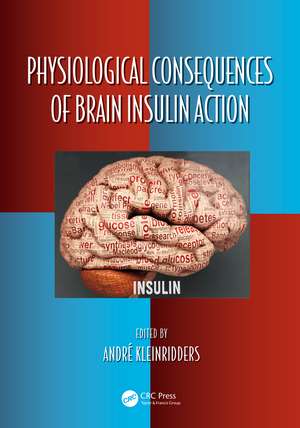Physiological Consequences of Brain Insulin Action: Oxidative Stress and Disease
Editat de André Kleinriddersen Limba Engleză Hardback – 6 sep 2022
Key Features:
- Summarizes insulin and the closely related IGF-1 receptor signaling
- Depicts concepts of insulin resistance
- Highlights the importance of conserved brain insulin signaling for brain function, metabolism, and behavior
- Describes potential behavioral and pharmacological approaches to support brain insulin signaling
Din seria Oxidative Stress and Disease
-
 Preț: 356.64 lei
Preț: 356.64 lei -
 Preț: 379.25 lei
Preț: 379.25 lei - 18%
 Preț: 1330.94 lei
Preț: 1330.94 lei - 11%
 Preț: 319.88 lei
Preț: 319.88 lei - 15%
 Preț: 556.99 lei
Preț: 556.99 lei - 25%
 Preț: 410.54 lei
Preț: 410.54 lei - 15%
 Preț: 316.54 lei
Preț: 316.54 lei - 29%
 Preț: 1188.26 lei
Preț: 1188.26 lei -
 Preț: 436.95 lei
Preț: 436.95 lei - 18%
 Preț: 785.60 lei
Preț: 785.60 lei -
 Preț: 447.52 lei
Preț: 447.52 lei -
 Preț: 441.97 lei
Preț: 441.97 lei -
 Preț: 437.13 lei
Preț: 437.13 lei -
 Preț: 356.61 lei
Preț: 356.61 lei - 33%
 Preț: 712.64 lei
Preț: 712.64 lei - 18%
 Preț: 1119.30 lei
Preț: 1119.30 lei - 18%
 Preț: 1343.11 lei
Preț: 1343.11 lei - 5%
 Preț: 603.59 lei
Preț: 603.59 lei - 18%
 Preț: 1340.43 lei
Preț: 1340.43 lei - 18%
 Preț: 1349.89 lei
Preț: 1349.89 lei - 18%
 Preț: 2235.06 lei
Preț: 2235.06 lei - 15%
 Preț: 470.32 lei
Preț: 470.32 lei -
 Preț: 458.67 lei
Preț: 458.67 lei - 10%
 Preț: 317.80 lei
Preț: 317.80 lei - 5%
 Preț: 1038.51 lei
Preț: 1038.51 lei - 5%
 Preț: 1290.50 lei
Preț: 1290.50 lei -
 Preț: 431.18 lei
Preț: 431.18 lei - 18%
 Preț: 1866.69 lei
Preț: 1866.69 lei - 26%
 Preț: 1414.22 lei
Preț: 1414.22 lei - 28%
 Preț: 1525.52 lei
Preț: 1525.52 lei - 29%
 Preț: 1407.70 lei
Preț: 1407.70 lei - 26%
 Preț: 1299.29 lei
Preț: 1299.29 lei - 28%
 Preț: 1576.34 lei
Preț: 1576.34 lei - 26%
 Preț: 1351.70 lei
Preț: 1351.70 lei - 28%
 Preț: 1415.04 lei
Preț: 1415.04 lei - 21%
 Preț: 1497.55 lei
Preț: 1497.55 lei - 25%
 Preț: 1052.93 lei
Preț: 1052.93 lei
Preț: 1000.27 lei
Preț vechi: 1219.84 lei
-18% Nou
Puncte Express: 1500
Preț estimativ în valută:
191.46€ • 208.04$ • 160.93£
191.46€ • 208.04$ • 160.93£
Carte tipărită la comandă
Livrare economică 21 aprilie-05 mai
Preluare comenzi: 021 569.72.76
Specificații
ISBN-13: 9780367529482
ISBN-10: 0367529483
Pagini: 270
Ilustrații: 7 Tables, black and white; 10 Line drawings, black and white; 16 Halftones, color; 3 Halftones, black and white; 16 Illustrations, color; 13 Illustrations, black and white
Dimensiuni: 178 x 254 x 16 mm
Greutate: 0.45 kg
Ediția:1
Editura: CRC Press
Colecția CRC Press
Seria Oxidative Stress and Disease
ISBN-10: 0367529483
Pagini: 270
Ilustrații: 7 Tables, black and white; 10 Line drawings, black and white; 16 Halftones, color; 3 Halftones, black and white; 16 Illustrations, color; 13 Illustrations, black and white
Dimensiuni: 178 x 254 x 16 mm
Greutate: 0.45 kg
Ediția:1
Editura: CRC Press
Colecția CRC Press
Seria Oxidative Stress and Disease
Public țintă
Postgraduate and ProfessionalCuprins
1 Molecular mechanisms of brain insulin signaling
2 Insulin/IGF signaling in early brain development
3 Insulin signaling modulates neuronal metabolism
4 Regulation of glial function by insulin peptides
5 Neuroendocrine interactions in the control of glucose- and energy homeostasis
6 Hypothalamic neuronal circuits are modulated by insulin and impact metabolism
7 Insulin and brain reward systems
8 The impact of insulin on brain serotonergic system: consequences on diabetes-associated mood disorders
9 Organ cross-talk regulates (brain) insulin action
10 Insulin resistance as a risk factor for Alzheimer’s disease
11 Brain insulin action in the control of metabolism in humans
12 Impact of dietary and exercise interventions on brain insulin action and brain function
13 Pharmacological and surgical interventions to improve brain insulin resistance
2 Insulin/IGF signaling in early brain development
3 Insulin signaling modulates neuronal metabolism
4 Regulation of glial function by insulin peptides
5 Neuroendocrine interactions in the control of glucose- and energy homeostasis
6 Hypothalamic neuronal circuits are modulated by insulin and impact metabolism
7 Insulin and brain reward systems
8 The impact of insulin on brain serotonergic system: consequences on diabetes-associated mood disorders
9 Organ cross-talk regulates (brain) insulin action
10 Insulin resistance as a risk factor for Alzheimer’s disease
11 Brain insulin action in the control of metabolism in humans
12 Impact of dietary and exercise interventions on brain insulin action and brain function
13 Pharmacological and surgical interventions to improve brain insulin resistance
Notă biografică
Prof. Dr. André Kleinridders is Professor for Experimental and Molecular Nutritional Medicine at the Institute of Nutritional Science at the University of Potsdam, Germany. Dr. Kleinridders’ research program aims at understanding causes and consequences of brain insulin resistance with implications for diabetes, obesity and neurological disorders. His studies focus on in the interaction of mitochondrial function and insulin signaling and its consequences on energy homeostasis and behavior. Several publications establish Dr. Kleinridders’ unique research focus on the role of brain insulin in metabolic disorders.
Descriere
The brain is crucial for the regulation of whole-body metabolism and behavior. The pancreas-derived hormone insulin modulates brain function and affects energy metabolism as well as cognition.
